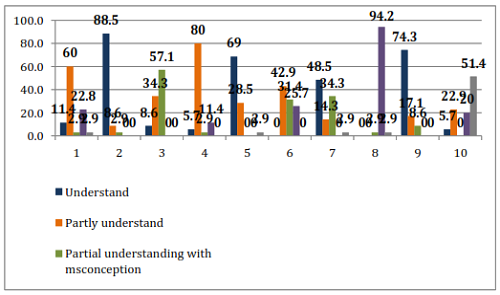
Analysis of Concept Understanding in Material Colligative Properties of Solutions in View of the Tendency of Student Learning Styles at SMA N 1 Gunung Talang
Abstract
Education is an important thing in achieving the goal of ability through the learning process in the classroom. Benchmarks for the success of the learning process are seen through students' understanding of concepts. Correct understanding of concepts creates enduring knowledge. The influencing factor in understanding the concept is learning style, because learning style influences the maximum a person absorbs information. This research is a descriptive research aimed at analyzing and describing (1) understanding of the concept of colligative properties of the solution, (2) learning styles of students, (3) understanding of the concept of colligative properties of solutions in terms of the tendency of students' learning styles. The subjects of this study were class XII MIPA 1 SMA N 1 Gunung Talang, which consisted of 35 people. The instruments used in this study were the Kolb model learning style questionnaire and open-ended questions. The results of the research data analysis show that (1) the learning style of students in class XII MIPA 1, the assimilation learning style is 51.4%, the divergent is 22.9%, the convergent is 17.1%, and the accommodation is 8.6%, ( 2) Students' understanding of the concept of colligative properties of solutions is in the partial understanding category (3) Understanding of concepts in colligative properties of solutions in terms of the tendency of students' learning styles for convergent, divergent, and accommodation learning styles is in the understand category, and assimilation learning styles are in the partially understood category.
Keywords
Full Text:
PDFReferences
Azwar, S. (1987). Tes Prestasi. Yogyakarta: Liberty.
Calik, M & Ayas, A. (2005). Kegiatan analogi untuk menggabungkan konsepsi siswa tentang jenis solusi. Dalam Forum Asia-Pasifik Tentang Pembelajaran Dan Pengajaran Sains, 6(2), 1–3.
Dewi, S. Z., & Ibrahim, T. (2019). Pentingnya Pemahaman Konsep Untuk Mengatasi Miskonsepsi Dalam Materi Belajar IPA di Sekolah Dasar. Jurnal Pendidikan UNIGA, 13(1), 130–136.
Fadilah, S. (2016). Meremediasi Miskonsepsi Siswa Berbasis Gaya Belajar Dimensi Pemahaman Pada Konsep Ikatan Kimia Menggunakan Concept Attainment (Remediate Student’s Misconception Dimensions Of Understanding Student’s Learning Style Based To The Concept Of Chemical Bonds With Concept Attainment). Unesa Journal of Chemical Education, 5(2).
Hairy, M. R., Kusmiyati, K., & Yamin, M. (2018). Analisis Penguasaan Konsep Materi Sistem Reproduksi Pada Siswa SMA Negeri Di Kota Mataram. Jurnal Pijar MIPA, 13(2), 119–123.
Hariwijaya, M. (2015). Metodologi dan Teknik Penulisan Skripsi, Tesis Desertasi. Yogyakarta, Elmatera: Diandra Kreatif.
Kazu, I. Y. (2009). The Effect of Learning Styles on Education and The Teaching Process. Social Sciences.5(2): 85-94
Kolb, D. (2011). Experiental Learning. New Jersey, Preantice-Hall, Inc.
Kuswana, W. S. (2012). Taksonomi Kognitif. Bandung: PT. Remaja Rosdakarya.
Muchtar, Z. (2012). Analisis Miskonsepsi Siswa Terhadap Kimia Asambase Di SMA Di Medan. Jurnal Pendidikan Dan Praktik, 15(3), 65–74.
Nasional, D. P. (2003). Undang-Undang Republik Indonesia No. 20 Tentang Sistem Pendidikan Nasional. Jakarta, Direktorat Pendidikan Menengah Umum.
Nasution, S. (2013). Berbagai Pendekatan dalam Proses Belajar & Mengajar. Jakarta: Bumi Aksara.
Nasution, S. (2015). Berbagai Pendekatan dalam Proses Belajar & Mengajar. Jakarta: Bumi Aksara.
RI., P. P. (2013). Undang-Undang Republik Indonesia No.65 tentang Standar Proses Pendidikan Dasar dan Menengah. Jakarta, Direktorat Pendidikan Menengah Umum.
Sudijono, A. (2011). Evaluasi Pendidikan. Jakarta: Raja Grafindo Persada.
Sugiyono. (2016). Metode Penelitian Kuantitatif, Kualitatif, R&D. Bandung: PT. Alfabet.
Sumaatmadja, N. (2005). Konsep Dasar IPS. Jakarta: Universitas Terbuka.
Tanta. (2010). Pengaruh Gaya Belajar terhadap Hasil Belajar Mahasiswa pada Mata Kuliah Biologi Umum Program Studi Pendidikan Biologi Universitas Cendrawasih. Kreatif.1(1): 7–21.
Uno, H. B. (2006). Orientasi Baru dalam Psikologi Pembelajaran. Jakarta: Bumi Aksara.
Uno, H. B. (2008). Teori Motivasi dan Pengukurannya. Jakarta: Bumi Aksara.
Widiasworo, E. (2017). Strategi dan metode mengajar siswa di luar kelas (outdoor learning) secara aktif, kreatif, inspiratif, dan komunikatif. Yogyakarta, Ar-Ruzz Media.
Widodo, D. (2017). Metodologi penelitian populer & praktis. Jakarta: PT RajaGrafindo Persada.
DOI: http://dx.doi.org/10.31258/jes.7.2.p.314-323
Refbacks
- There are currently no refbacks.
Copyright (c) 2023 Nabilla Sukma

This work is licensed under a Creative Commons Attribution 4.0 International License.
Publisher: FKIP Universitas Riau












